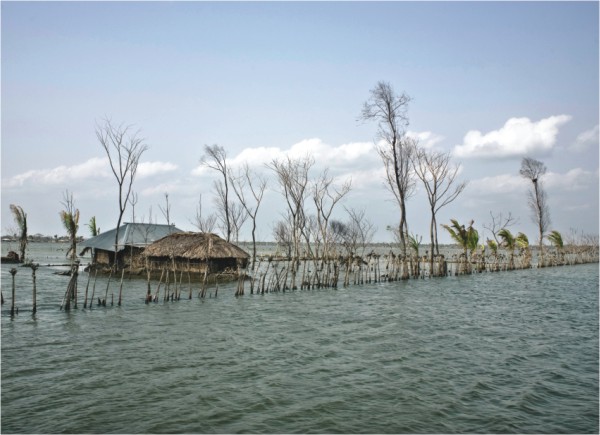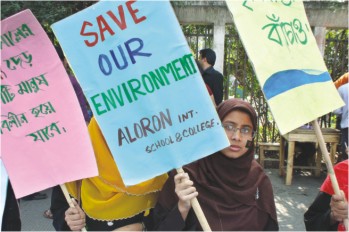 |
||||||||||||
Energy roadmap - an illusion?--M. Tamim Providing electricity to people--M. Asaduzzaman For a national rapid transit system--Tanvir A. Khandaker Gas crisis: Sustainable solutions -- Ridwan Quaium Solar Bangla to Shonar Bangla -- Salahud Din Ahmed Transport infrastructure: Altering its skewed pattern -- Tawfique Ali Sustainable environment: Challenges ahead -- Pinaki Roy Bangladesh's role in climate negotiations -- Dr. Atiq Rahman Climatic signals on development antenna -- Dr. Dwijen Mallick Major disasters and management issues -- Mahbuba Nasreen
|
||||||||||||
 |
||||||||||||
Photo: Wahid Adnan/Driknews |
||||||||||||
Bangladesh's role in climate negotiations Dr. Atiq Rahman The Fifteenth Conference of the Parties (CoP 15) held in Copenhagen in December 2009 was criticized for not being a totally UN based process, poor outcomes and a failure to reach a consensus on a comprehensive and legally binding agreement on mitigation, adaptation and adequate funding for action. Thus COP 15 was built up to be a “Hopenhagen” but unfortunately turned out to be a “brokenhagen”. The process of CoP15 was weak and it was obstructed by the narrow national and group interests particularly of the developed country parties led by USA and the BASIC group of major emerging emitters such as China, India, Brazil and South Africa. There was also a fear that climate change negotiation may face a deadlock or semi-collapse like other trade negotiations under the Doha rounds of the WTO. The COP-16 held in Cancun, Mexico in December 2010 has some successes and it really gave life to the UN climate negotiations and demonstrated some hope for the next CoP 17 to be held in Durban in South Africa in December 2011. In the backdrop of the grand failure of Copenhagen the expectation in Cancun was low regarding a fair and major climate deal. But it helped to put the UN climate negotiation back on the right track and thus saved the process. As a leader of Bangladesh Delegation summarized the outcomes “he was not unhappy with the Cancun results”. Further, the usual question was what is one thing that will make Cancun acceptable. The most popular response from the delegates was “money on the table”. 30 billion dollar was assured in Cancun though the process for fund management and allocation for different streams of action in relation to adaptation, mitigation, technology and capacity building etc. was not decided. But the real issue of mitigation commitment by the rich industrialized countries was side tracked and put under the carpet. The CoP16 in Cancun also agreed on a shared vision for long-term cooperative action, urgent measures for both adaptation (resilience building and climate risk reduction) and mitigation i.e., GHG emission reduction to keep the rise of global temperature below 2 degree Celsius from the pre-industrial level in the current century. But no commitments and targets were fixed in Cancun. This major task has been left for Durban in December 2011. Cancun also strengthening the text on NAMA (Nationally Appropriate Mitigation Action) for large growing economics and developing countries, who are the potential emitters in the near future. Role of Bangladesh and the reality Bangladesh has shown its able and dynamic leadership in the previous CoPs as a key driver of LDCs positions, Bangladesh's own issues and commitments as well as political wisdom. Formulations of Bangladesh National Adaptation Programme of Action (NAPA) and Bangladesh Climate Change Strategy and Action Plan (BCCSAP) were well acclaimed by the global communities. Creation of the Bangladesh Climate Change Fund from its own resources and the multi-donor Climate Resilient Trust Fund to implement BCCSAP by the government and with support from developed country parties in Bangladesh are considered as bold steps towards addressing climate change. While Bangladesh has received much attention and praise for the early steps, several challenges emerge. The challenges involve optimal, and better fund management and equitable allocation of the existing funds for vulnerable people and sectors including agriculture, food security and social protection, infrastructure, water, health and disaster risk reduction, research, knowledge and capacity building. The government has to show its integrity, transparency, responsiveness and accountability in its climate fund management, which may usher the wider scope of getting greater support from global communities including the industrialized country partners, the UN systems and others. In these early stages, the initial funds were distributed mainly to government agencies and to few NGOs and research organizations. There are serious challenges for the organizations who received climate funds from the government. They have to prove their climate focus of investment, accountability, transparency, seriousness in action and best utilization of funds efficiently, particularly reducing the vulnerability of the poor. Bangladesh's focus continues to remain rightfully on adaptation considering country's vulnerability, though mitigation must also needs serious attention. In Bangladesh majority people are poor and they are living in different climate affected zones in cyclone and salinity prone coastal areas, floodplains, drought prone upland, hilly areas and in urban slums. They need urgent support for adaptation, disaster risk reduction, food, water and health security and social protection. Bangladesh is in a good position for accessing international funds and global cooperation for addressing climate change primarily for adaptation and climate disasters. Another challenge for the country is showing intellectual leadership for promoting sustainable development while addressing climate change. Bangladeshi scientists and civil society groups have asserted their leadership and presence in Cancun. Bangladesh scientists and civil society organizations are giving global leadership in promoting the community based adaptation science, practices and policies. Emerging concerns for Durban
We have very limited time in hands for the negotiators and global leaders to show their political will and eagerness for actions to save the planet and the people from the wrath of runway climate change. Series of inter-sessional meetings under the UNFCCC will be held in Bangkok and Bonn in the next few months before CoP-17 in Durban. The negotiators and decision maker must remember that higher GHG emission leads to higher costs for mitigation and even greater impacts and costs for adaptation. The costs for mitigation and adaptation increase since emission reduction is not happening adequately, particularly in the developed world. Without much action and strategy for GHG reduction by OEDC and rich countries no good progress could be made. The BASIC group (comprising of Brazil, South Africa, India and China) will not make any serious commitment if the annex-1 countries do not commit and reduce emission first urgently and the BASIC group and developing countries including the LDCs and the Most Vulnerable Countries (MVCs) can only work on their sustainable development paths and renewable energy systems. Right now their priority is adaptation and climate change risk reduction i.e., protecting their people, poverty alleviation and main streaming of climate change in their development processes. Last hope for KP in Durban Climate fund management and accountability Science people and climate justice It has to be emphasized that climate change is emerging as the greatest issue of justice and human rights in the twenty first century. Science based evidence of high impacts, low carbon emission reduction efforts, inequality and injustice between the affected masses and the emitters will become the central issues in a post-Durban world. UN processes can only address international injustice of climate change. The intra-national and generalized equity and fairness issues will have to enter the climate discourse in the near future. Durban is a key mile-post of a potentially “high COP”, where the future of the KP process will be decided. Any shirking of this responsibility will only push the climate injustice and inequality into a more insecure world. The global leadership must not miss the Durban opportunity for greater mitigation actions, trust building, adaptation financing, greater technology transfer and capacity building and a shared responsibility for a fairer and safer world. The global civil society has a role to mobilize mass opinions and put pressure on the political leadership and decision makers particularly in the developed world so that Durban must produce a legally binding and fair climate deal in December 2011. Dr. Atiq Rahman, Executive Director of Bangladesh Centre for Advanced Studies (BCAS) and Chair of Climate Action Network South Asia (CANSA) |
||||||||||||
